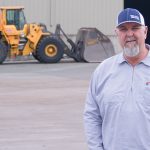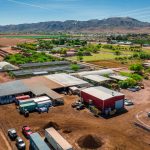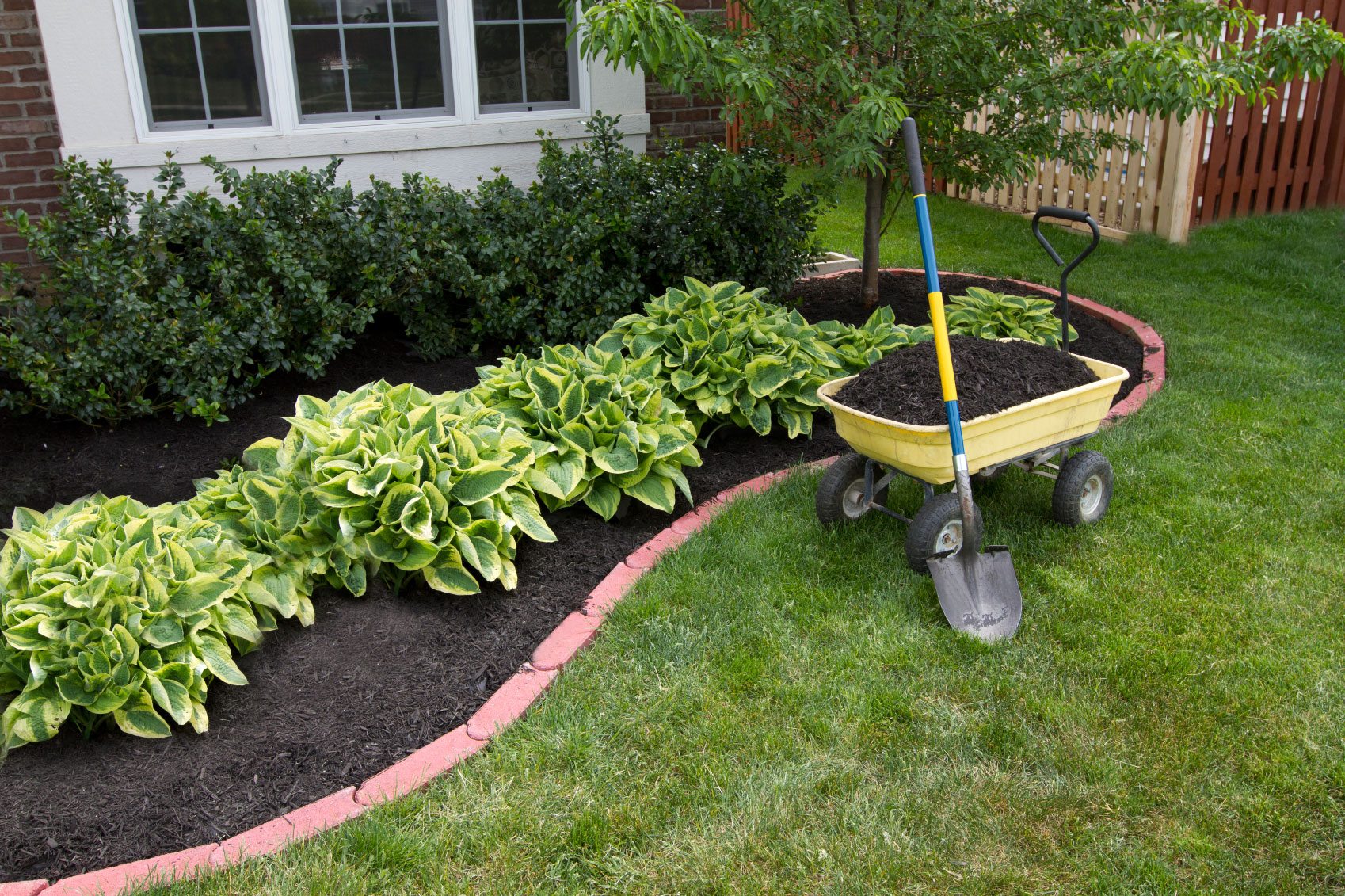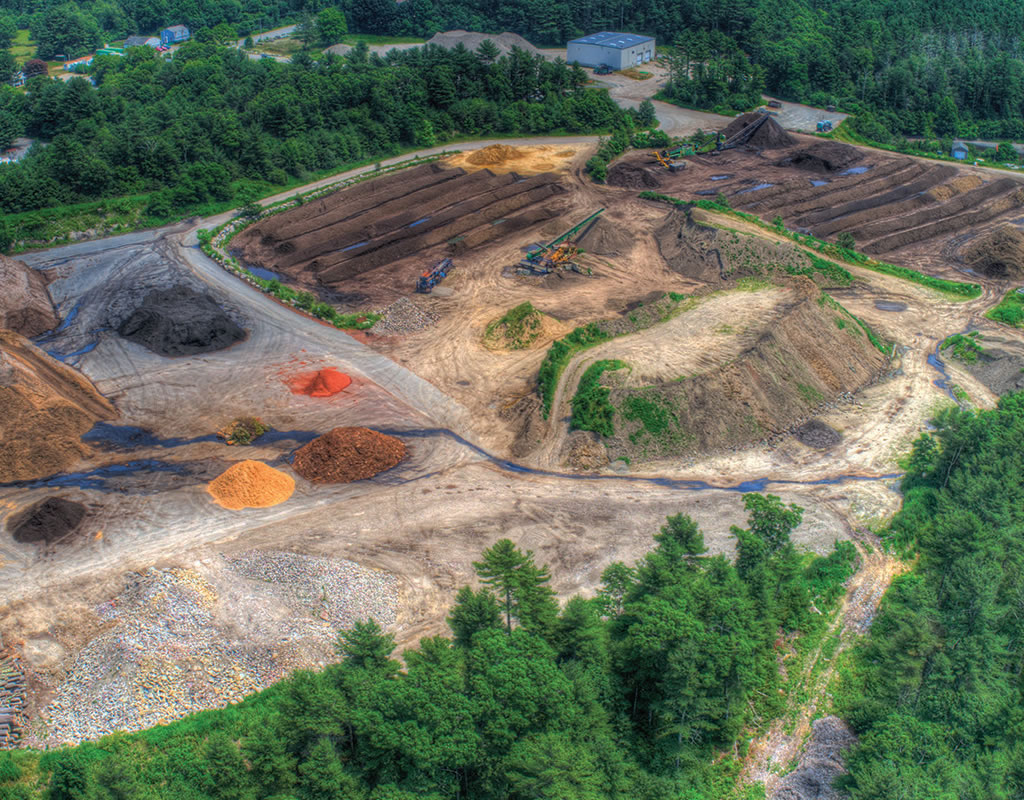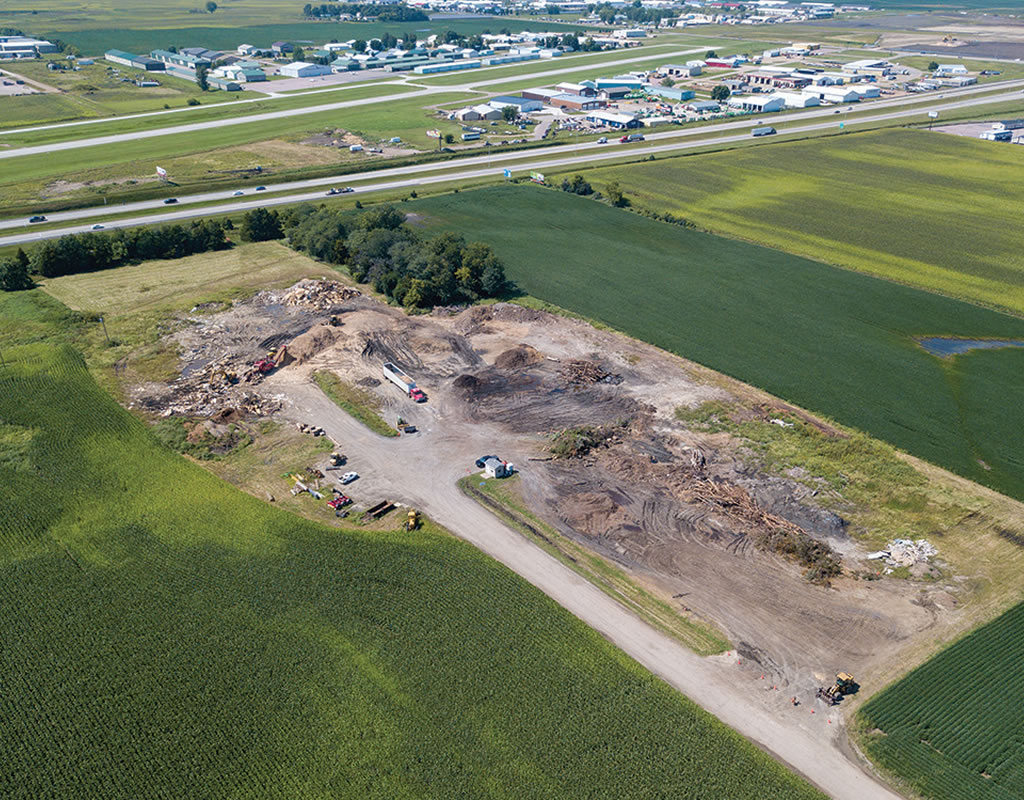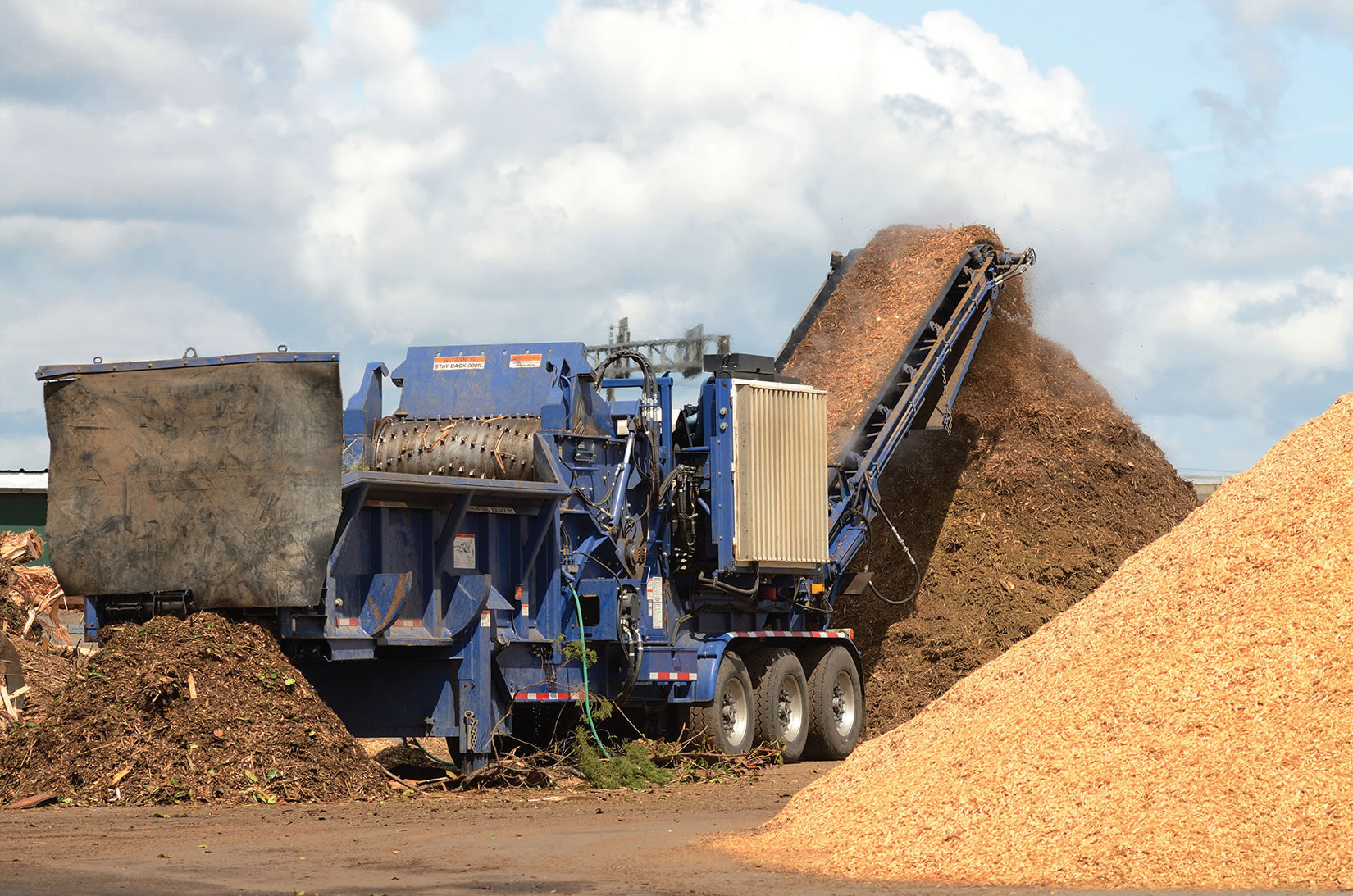By P.J. Heller
Sam DeLullo enjoys getting out of the office now and then to visit and reconnect with customers he hasn’t seen for a while.
“The most interesting thing I find is to see what’s changed over the course of the years,” says DeLullo.
The same is certainly true for anyone who comes back to visit Woodbed Corp. (WOODBED CORP.), where the 29-year-old DeLullo is general manager.
Started by his father, Robert DeLullo, some 30 years ago, the company – actually two separate companies, DeLullo Trucking Corp., and Woodbed Corp., that are under single ownership – has grown to become a premium wood products supplier and trucking company. Today, it operates from a 35-plus acre site in rural St. Marys, PA, employs some 50 people, runs a fleet of more than 26 trucks (with another 25 or 30 hired/leased/subcontracted during peak periods) and maintains a 29-acre storage facility for some finished products just outside Springville, NY, about 90 miles from St. Marys. The companies have a combined total of nearly 200 pieces of equipment.
In addition to its focus on mulch, the company sells firewood, wood fibre for playground areas, wood pellets, sawdust and compost. It also offers services including timber harvesting, land clearing, whole tree chipping and trucking.
The synergy between DeLullo Trucking and Woodbed Corp., is unmistakable.
DeLullo Trucking brings in wood products from area sawmills as well as from forest management projects within a 50- to 75-mile radius. Woodbed then repurposes the wood products into premium mulch products, wood fibre for playgrounds, firewood and erosion control products. DeLullo Trucking then delivers those products to customers within a 150-mile radius, stretching from Niagara Falls and Rochester, NY, to south of Pittsburgh and Altoona, PA. The company also markets both mushroom and leaf composts.
The company’s mushroom compost comes from the Philadelphia and Avondale, PA, areas (Avondale is also home to the American Mushroom Institute) and then is resold by Woodbed.
“That’s one of the furthest places we go to pick up a product, but it’s a very good product . . . it really helps lawns, garden, soil erosion problems, retention ponds, mine reclamation for filtering water . . . ” DeLullo says.
Woodbed products are sold and delivered in bulk to landscape centers, landscapers and retail centers. The company does not focus on retail sales other than firewood, animal bedding and wood pellets.
Woodbed’s focus is primarily on mulch and chips, DeLullo says, with the company producing upwards of 400,000 yards of mulch and chip products annually. Combined with the trucking operation, that accounts for roughly 50 percent of the company’s business.
“We send out high-quality products,” DeLullo says. “We want consistency. We want the first load to look like the last load. So we really monitor what we do in the mulch business.
“You can make mulch a lot of different ways – it depends on your application – but we’re focused on making high-quality mulch,” he adds. “We use virgin products. We’re not making mulch out of straight land-clearing debris, dirty chips or C&D material.”
Robert DeLullo, 58, who remains active in the business today and serves as president, started the trucking company in 1990 after the sawmill he was driving for decided to get out of trucking.
He was able to buy a truck and began hauling sawmill residuals, such as wood chips to paper mills and sawdust to farms. With few mulch manufacturers in his area, he would haul bark from the sawmills to mulch manufacturers, primarily to Mainline Products, in eastern Pennsylvania.
Recognizing that there might be a market for mulch in the St. Marys area, DeLullo continued hauling bark east from the sawmills and brought the finished product – mulch – back to sell to retail centers and landscapers.
“He was just a broker at the time,” his son recalls. “It sort of started him into the mulch business.”
By the early 2000s, DeLullo had nearly a dozen trucks and was working with more sawmills, delivering their residuals to farms, chip plants and bringing back mulch to resell.
All that changed around 2004, when fuel prices jumped dramatically.
“Around 2004, we went on a family vacation,” Sam DeLullo recalls. “Fuel when we left was under $1 a gallon. We were gone for a week and when we came back, fuel was over $1.50 a gallon. All of a sudden the trucks that made the trips out east and back the week we were on vacation lost money on every trip. We couldn’t make it work. It was getting too expensive. The mulch industry couldn’t afford to spend that much extra money just because fuel prices went up and how far he was taking it.”
That forced the elder DeLullo to re-evaluate his business model. Rather than hauling mulch back from far away manufacturers, he purchased some additional acreage in St. Marys and a tub grinder and began producing his own mulch. He had already been using the Woodbed name on his trucking invoices.
“He was either selling a wood bed for cows for bedding or he was selling a wood bed for plants for growing in,” Sam DeLullo explains. “It (the Woodbed name) was on his invoices for a long time.”
By the mid-2000s, as colored mulches were becoming more popular, he purchased a coloring machine and began offering colored mulches. Today the company offers cherry brown, chocolate brown, premium black and vivid red-colored mulches as well as premium natural mulches.
Woodbed also has a long history of manufacturing a wood fibre playground material that is marketed by a Harrisburg company. That state-certified material typically goes under swing sets, slides and other playground apparatus to absorb high impacts and can also be used on trails.
In 2008 when the “great recession” hit, the bottom dropped out of the housing market with a subsequent decline in sawmill production. Unable to get enough wood chips to make the playground/trail product, DeLullo again took the initiative, purchasing a whole-tree wood chipper.
“We went from we can't buy chips to we can buy the stuff to make it into chips,” Sam DeLullo says. “We bought the chipper and we brought in pole wood and made chips in the yard.”
That necessitated the hiring of additional employees. To keep them busy at the end of the mulch season, Robert DeLullo purchased a local company that was using pole logs to produce firewood using a firewood processor.
Expansion and growth continued over the years, with the company moving into markets in the Buffalo and Pittsburgh areas.
“At our facility, we’re fortunate that there are a lot of sawmills nearby,” DeLullo says. The company’s premium single, double and triple ground undyed mulches are made from 100 percent bark and aged no less than nine months, he notes.
“One thing my father always preached to me was ‘junk in equals junk out’. So, if you're getting junk raw product in, you're most likely to be sending junk finished product out. We try to really watch our raw products coming in. We really focus on virgin wood fibre that’s never been used for anything else. The only one that may have some recycled material in it is the red mulch because we don’t have enough access to clean white wood to make our red. So red mulch has some repurposed wood pallet material in it. But for all the other products, we try to focus on virgin wood fibre that’s never been used for anything else.”
Woodbed is located in what DeLullo describes as the “hardwood capital of the world.”
“Pennsylvania hardwoods are known throughout the world for their quality, beauty and sustainability,” the state Agriculture Department says. “Pennsylvania leads the nation in the production and export of hardwood lumber. Our forests are the source of diverse secondary wood products ranging from veneer, cabinetry and flooring, to baseball bats, snow boards and drumsticks. With 16.6 million acres of forestland, Pennsylvania has the most abundant hardwood forest in the nation.”
“The highest quality hardwoods in the United States are found in north-central and northwestern Pennsylvania. Our state is the top producer of hardwoods in the U.S.,” agrees the Allegheny Hardwood Utilization Group (AHUG), which represents 14 counties in those regions, including Elk County, where St. Marys is located. “… The region contains some of the finest forest resources in the world.”
Sam DeLullo is a board member of AHUG, a nonprofit organization whose goal is to expand and diversify the forest products industry while maintaining sustainable, high-yield forests within its 14-county region.
While the majority of wood material coming into the company is from 40 or 50 sawmills, it also takes in wood recycling material – brush, grass and leaves and wood products including wood pallets – from St Marys residents under a program sponsored by the city. The unmanned drop-off location is open seven days a week during daylight hours.
“The grass and leaves we’ll compost down and turn into a soil product. The brush we’ll turn into a mulch product. And the wood pallets will turn into an erosion control product or it will go toward some red mulch,” DeLullo says.
Woodbed also works with state and federal agencies as well as organizations such as Hardwoods Development Council (HDC), which includes the Allegheny Hardwood Utilization Group, Pennsylvania Forest Product Association, Pennsylvania Sustainable Forestry Initiative and the Mulch and Soil Council.
Last August, Woodbed hosted state Agriculture Secretary Russell Redding and the HDC to highlight Gov. Josh Shapiro’s increased funding – from $474,000 to $725,000 – for hardwood research and promotion. DeLullo also led a tour through the Woodbed facility and discussed plans to use a $300,000 Wood Innovations Grant the company received from the U.S. Agriculture Department. The grant was to improve low-grade wood utilization and invasive pest control by enhancing operations to provide kiln-dried commercial firewood and home heating products.
“As a business, the support of the state and federal government adds significant resources and momentum to our development,” DeLullo said during the tour.
With the grant, Woodbed plans to install a kiln in the next few months, which will allow it to expand its firewood offerings with low-grade wood.
“We’ve been in the firewood business since 2008,” DeLullo says. “All we offer is seasoned firewood.”
Restrictions on that seasoned firewood include not allowing it to be transported across state lines due to pest control concerns.
Installing the kiln, however, will allow Woodbed to heat-treat or kiln dry the low-grade wood, eliminating any pest issues and then it will be able to sell the firewood across state lines.
“We decided to do that to be a player in the low-grade utilization [market],” DeLullo explains.
He says Woodbed has numerous competitors but describes that situation as a good thing.
“All competition does is drive the producers to make a better product and give the consumer a better price,” he says. “There are mulch companies that we compete with that are cheaper than us or have similar products, but we try to focus on quality, consistency and service.”
Orders placed before noon, for example, are usually delivered the same day or by the next morning, he notes.
The rise in fuel prices that Robert DeLullo faced in early the 2000s remain an issue for the company two decades later.
“Fuel is a huge issue,” Sam DeLullo says. “In our industry, there’s a lot of fuel expense. There’s a fuel expense of getting the product from the sawmill to our yard. There’s a fuel expense of moving the product. There’s a fuel expense of grinding the product, of coloring the product, of putting it into a pile, of loading the product, and trucking it back out to the customer. So fuel is huge player for us.”
To address that issue, the company has begun investing in electric equipment, automatic transmissions for better fuel mileage in its fleet, and utilizing larges stackers.
He stresses that watching costs and overhead and being more efficient is critical due to mulch prices remaining relatively static for years.
“The mulch industry is a little tougher,” he says. He notes that mulch prices for the general public have changed little over the last two decades while other costs to run the business have steadily increased.
Despite those challenges, DeLullo is looking to the future.
“Right now our focus is on making sure our mulch stays consistent, working our Springville facility and focusing on the firewood industry,” he says.
While all of that is designed to retain customers and attract new ones, DeLullo says there are some businesses that might not be a good fit for Woodbed.
“I’ve always told our salespeople that I was training that if you walk into a customer and the first thing they ask you is ‘what’s the price’ and ‘how cheap can you do it,’ just tell them ‘thank you,’ they're probably not for us. If that’s their first focus . . . We’re not the cheapest because we’re using quality products. You can buy dyes that are way cheaper that aren't going to last but we run top tier everything,” he says.
Related News
Subscribe Today
Every other month, Soil & Mulch Producer
News brings you important stories about:
• New Technology
• Products
• Industry News
• Research Studies
Soil & Mulch Producer News features articles and services relevant to your daily operations.


